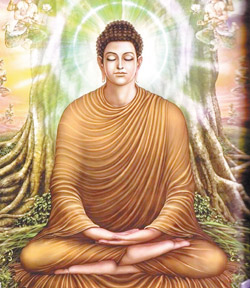Vesak the Thrice Blessed Day
Vesak is the most sacred day of Theravada Buddhism. Also called
Visakha, Vesak is an observation of the birth, enlightenment and demise
(Parinibbana) of the Buddha.Visakha is the name of a month of the Indian
lunar calendar, and "puja" means "religious service." So, "Vesak Puja"
can be translated "the religious service for the month of Visakha."
 In English, sometimes it is called "Buddha Day." Vesak is held on the
first full moon day of Visakha. There are diverse lunar calendars in
Asia that number the months differently, but the month during which
Vesak is observed usually coincides with May. In English, sometimes it is called "Buddha Day." Vesak is held on the
first full moon day of Visakha. There are diverse lunar calendars in
Asia that number the months differently, but the month during which
Vesak is observed usually coincides with May.
Most Mahayana Buddhists observe these three events of the Buddha's
life at three different times of year. However, most of the time the
Mahayana celebration of the Buddha's Birthday coincides with Vesak.
Exceptions: In Japan, Buddha's Birthday is observed every year on April
8, by the Gregorian calendar instead of a lunar calendar.
The Tibetan Buddhist equivalent of Vesak Puja is called Saga Dawa
Duchen and usually falls a month later, in June.
Observing Vesak
For Theravada Buddhists, Vesak is a major Uposatha day to be marked
by rededication to the dharma and the Eightfold Path. Bhikkhus and
Bhikkhunis meditate and chant the ancient rules of their orders. Lay
people bring flowers and offerings to the temples, where they may also
meditate and listen to talks. In the evenings, often there will be
solemn candlelight processions.Of course, in some places the religious
observances are accompanied by more gala, and more secular, celebrating
-- parties, parades, festivals. Temples and city streets may be
decorated with countless lanterns.
 According to Buddhist legend, when the Buddha was born he stood
straight, took seven steps, and declared "I alone am the World-Honored
One." And he pointed up with one hand and down with the other, to
indicate he would unite heaven and earth. I am told the seven steps
represent seven directions -- north, south, east, west, up, down, and
here. Mahayana Buddhists interpret "I alone am the World-Honoured One"
in a way that "I" represents all sentient beings throughout space and
time -- everyone, in other words. According to Buddhist legend, when the Buddha was born he stood
straight, took seven steps, and declared "I alone am the World-Honored
One." And he pointed up with one hand and down with the other, to
indicate he would unite heaven and earth. I am told the seven steps
represent seven directions -- north, south, east, west, up, down, and
here. Mahayana Buddhists interpret "I alone am the World-Honoured One"
in a way that "I" represents all sentient beings throughout space and
time -- everyone, in other words.
The ritual of "washing the baby Buddha" commemorates this moment.
This is the single most common ritual, seen throughout Asia and in many
different schools.
A small standing figure of the baby Buddha, with the right hand
pointing up and the left hand pointing down, is placed on an elevated
stand within a basin on an altar. People approach the altar reverently,
fill a ladle with water or tea, and pour it over the figure to "wash"
the baby.
Forty-five years had passed since the Buddha's enlightenment, and the
Blessed One was 80- years- old. He and his Bhikkhus were staying in the
village of Beluvagamaka (or Beluva), which was near the present-day city
of Basrah, Bihar state, northeast India. It was the time of the monsoon
rains retreat, when the Buddha and his disciples stopped traveling.
One day the Buddha asked the Bhikkhus to leave and find other places
to stay during the monsoon. He would remain in Beluvagamaka with only
his cousin and companion, Ananda. After the Bhikkhus had left, Ananda
could see that his master was ill. The Blessed One, in great pain, found
comfort only in deep meditation. But with strength of will he overcame
his illness.
Ananda was relieved, but shaken. When I saw the Blessed One's illness
my own body became weak, he said. Everything became dim to me, and my
senses failed. Ye I still had some comfort in the thought that the
Blessed One would not come to his final passing away until he had given
some last instructions to the Bhikkhus. The Buddha responded, "Now I am
frail, Ananda, old, aged, far gone in years. This is my eightieth year,
and my life is spent. My body is like an old cart, barely held together.
"Therefore, Ananda, be islands unto yourselves, refuges unto
yourselves, seeking no other refuge; with the Dharma as your island, the
Dharma as your refuge, seeking no other refuge.Soon after he had
recovered from his illness, the Buddha suggested he and Ananda spend the
day at the Capala Shrine. As they sat together, the Buddha remarked upon
the beauty of the scenery all around. The Blessed One continued,
"Whosoever, Ananda, has prefected psychic power could, if he so desired,
remain in this place throughout a world-period or until the end of it.
The Tathagata, Ananda, has done so. Therefore, the Tathagata could
remain throughout a world-period or until the end of it".
The Buddha repeated this suggestion three times. Ananda, possibly not
understanding, said nothing.Then came Mara, the evil one, who 45 years
earlier had tried to tempt the Buddha away from enlightenment. "You have
accomplished what you set out to do", Mara said. "Give up this life and
enter Parinibbana now.
"Do not trouble yourself, Evil One", the Buddha replied. "In three
months I will pass away and enter Nibbana".
Then the Blessed One, clearly and mindfully, renounced his will to
live on. The earth itself responded with an earthquake. The Buddha told
the shaken Ananda about his decision to make his final entry into
Nibbana in three months. Ananda objected, and the Buddha replied that
Ananda should have made his objections known earlier, and requested the
Tathagata remain throughout a world-period or until the end of it.The
Buddha and his Bhikkhus came to a grove of sal trees in Kushinagar. The
Buddha asked Ananda to prepare a couch between two trees, with its head
to the north. "I am weary and want to lie down", he said. When the couch
was ready, the Buddha lay down on his right side, one foot upon the
other, with his head supported by his right hand. Then the sal trees
bloomed, although it was not their season, pale yellow petals rained
down on the Buddha.
The Buddha spoke for a time to his Bhikkhus. At one point Ananda left
the grove to lean against a door post and weep. The Buddha sent a
Bhikkhu to find Ananda and bring him back. Then the Blessed One told
Ananda, "Enough, Ananda"! "Do not grieve! Have I not taught from the
very beginning that with all that is dear and beloved there must be
change and separation? All that is born, comes into being, is
compounded, and is subject to decay. How can one say: "May it not come
to dissolution"? This cannot be.
"Ananda, you have served the Tathagata with loving-kindness in deed,
word, and thought; graciously, pleasantly, wholeheartedly. Now you
should strive to liberate yourself". The Blessed One then praised Ananda
in front of the other assembled Bhikkhus.
Parinibbana
The Buddha spoke further, advising the Bhikkhus to keep the rules of
the order. Then he asked three times if any among them had any
questions. Do not be given to remorse later on with the thought: "The
Master was with us face to face, yet face to face we failed to ask him."
But no one spoke. The Buddha assured all of the Bhikkhus they would
realise enlightenment.Then he said, "All compounded things are subject
to decay. Strive with diligence".
Then, serenely, he passed into Parinibbana.
- Internet
|


